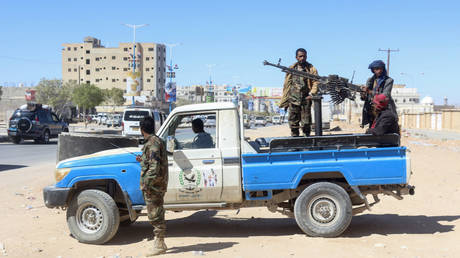
The warships will intercept weapons shipped to the Houthi rebels, the US Navy said
The US Navy announced on Wednesday that a new task force will patrol the waters of the Red Sea and the Gulf of Aden, connected by the narrow Bab al-Mandab strait. The force will target shipments of weapons to Yemen’s Houthi rebels, who launch drone and missile attacks on Saudi Arabia.
The unit will consist of between two and eight warships and will be part of the 34-nation Combined Maritime Forces, an organization that already has three other task forces conducting anti-piracy and smuggling patrols in nearby waters.
“These are strategically important waters that warrant our attention,” Vice Admiral Brad Cooper, commander of the US Fifth Fleet, told reporters.
He said the force will target the trafficking of people and drugs, as well as the ability of the Houthis to receive rockets and drones for attacks on Saudi Arabia and the UAE.
“We’ll be able to do it more vibrantly and more directly than we do today,” Cooper said.
Last month, the Houthis claimed responsibility for striking an oil facility in the Saudi city of Jeddah on the Red Sea coast. White House National Security Advisor Jake Sullivan condemned the attack on Jeddah and similar Houthi cross-border attacks as “acts of terrorism.”
According to a UN-brokered truce, which came in effect this month, Saudi Arabia must follow fuel ships into the Red Sea port of Hodeida. Riyadh previously maintained a blockade of the port, which it said was necessary to prevent the smuggling of weapons. The UN has banned the supply of weapons to the Houthis.
The Saudi-led coalition of Arab states has been fighting the Houthis in Yemen on behalf of ousted President Abdrabbuh Mansur Hadi and his government since 2015. The US and the coalition accuse Iran of arming the rebels. Tehran denies this allegation.
The US, along with its allies including the UK and France, meanwhile, are supplying weapons and intelligence to Saudi Arabia.
According to a November UN report, the death toll from the war in Yemen was expected to reach 377,000 by the end of 2021. Nearly 60% of the deaths have been from hunger, the lack of safe water, and disease, the UN said.




